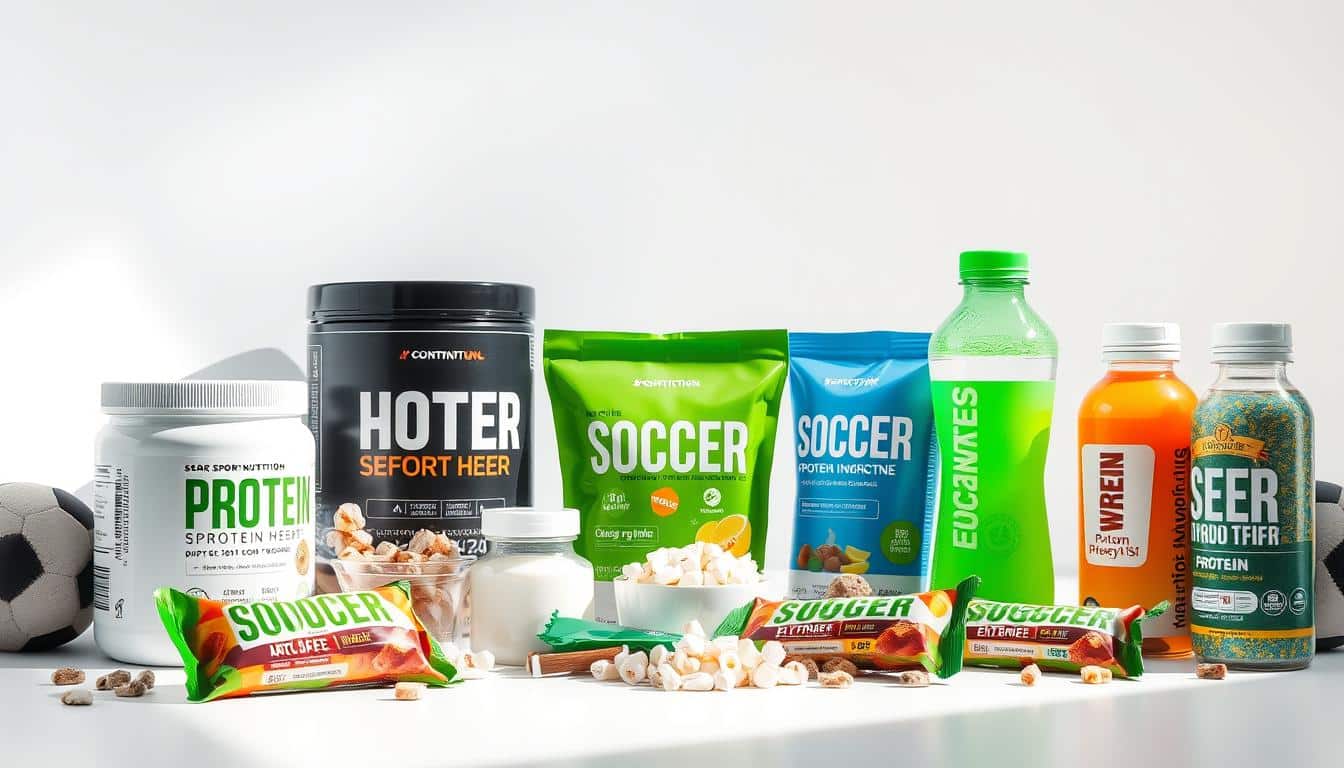What if you could unlock your full potential on the field with just a few simple additions to your routine? For athletes, performance is everything. Whether you’re sprinting down the pitch or recovering after a tough match, your body needs the right fuel to keep going.
This article dives into the best ways to enhance your game. We’ll explore how certain products can help you build stamina, recover faster, and stay sharp during intense moments. From endurance-boosting herbs to stamina-enhancing mushrooms, there’s something for every player.
Ready to take your soccer skills to the next level? Keep reading to discover the tools that can make a real difference.
Introduction to Supplements in Soccer
Nutrition plays a crucial role in how athletes perform and recover. Whether you’re training daily or competing in high-stakes matches, your body needs the right fuel to stay at its best. This is where supplementation comes into play, offering a way to fill nutritional gaps and enhance performance.

Understanding Supplement Basics
Supplements are products designed to provide nutrients that might be missing from your diet. They come in various forms, like powders, capsules, or drinks. For athletes, they can help improve energy, endurance, and recovery. Popular choices include creatine, sports drinks, and caffeine, which are widely used in elite sport settings.
The Importance of Nutrition in Soccer
Good nutrition is the foundation of athletic success. Whole foods provide essential vitamins, minerals, and energy. However, intense training schedules can make it hard to get everything you need from food alone. That’s why many athletes turn to supplements to support their performance and recovery. Studies show that over 60% of elite players use creatine, while sports drinks and caffeine are also common.
Overview of Current Supplement Research
Recent studies shed light on how specific nutrients can elevate athletic performance. Researchers are diving deeper into the science behind caffeine and creatine, two widely studied components. Their findings are shaping how athletes approach their daily routines.

Research Findings on Caffeine and Creatine
Caffeine is known for its ability to boost alertness and focus. Studies show that consuming 3-6 mg per kilogram of body weight can improve endurance and reaction time. This makes it a popular choice for athletes looking to stay sharp during long matches.
Creatine, on the other hand, is a powerhouse for energy. Research indicates that taking 0.3 grams per kilogram of body weight daily can enhance muscle power. In one study, young athletes saw significant improvements in sprint performance after just 14 days of use.
Timing is also crucial. Consuming these nutrients at the right time can maximize their benefits. For example, taking creatine post-workout helps with recovery, while caffeine is most effective when consumed 30-60 minutes before activity.
| Nutrient | Dosage | Benefits |
|---|---|---|
| Caffeine | 3-6 mg/kg | Boosts alertness and endurance |
| Creatine | 0.3 g/kg | Enhances muscle power and recovery |
These findings highlight the importance of daily nutrition in athletic performance. By incorporating science-backed strategies, athletes can unlock their full potential and stay ahead of the game.
Scientific Evidence Behind Performance Enhancements
Evidence supports the role of key nutrients in boosting recovery and strength. Research shows how specific ingredients can make a real difference in athletic performance. Let’s dive into the science behind these findings.
Reviewing Relevant Studies
Studies reveal that certain nutrients can significantly improve recovery. For example, caffeine has been shown to enhance alertness and endurance. Research indicates that 3-6 mg per kilogram of body weight can lead to better focus during intense activities.
Creatine is another powerhouse. Taking 0.3 grams per kilogram daily can boost muscle power. In one study, athletes saw improved sprint performance in just two weeks. These findings highlight the importance of timing and dosage for maximum benefits.
Here’s a quick summary of the evidence:
- Caffeine: Improves alertness and endurance when taken before activity.
- Creatine: Enhances muscle power and supports recovery post-workout.
- Beta-Alanine: Helps regulate muscle pH during intense exercise.
These studies emphasize the role of science in optimizing performance. By understanding the evidence, you can make informed choices that support your goals.
Supplements for Soccer Players: Caffeine and Creatine Focus
Boosting your game starts with understanding the right tools for your body. Two key ingredients, caffeine and creatine, can make a big difference in your performance. Let’s explore how they work and why they’re so effective.
Caffeine’s Impact on Agility and Speed
Caffeine is a game-changer for agility and speed. Studies show that taking 3-6 mg per kilogram of body weight can improve focus and endurance. This is especially helpful during high-intensity drills or long matches.
When consumed 30-60 minutes before activity, caffeine boosts alertness and reaction time. It’s like giving your brain and body a quick energy kick. This makes it a favorite among athletes looking to stay sharp.
Creatine’s Role in Sprint and Strength
Creatine is a powerhouse for muscle strength and sprint performance. Research suggests that 0.3 grams per kilogram daily can enhance muscle power. In just two weeks, athletes often see noticeable improvements in their speed and strength.
Taking creatine post-workout helps with recovery. It replenishes energy stores, so you’re ready for the next session. This makes it a must-have for anyone serious about their training.
| Nutrient | Dosage | Benefits |
|---|---|---|
| Caffeine | 3-6 mg/kg | Boosts alertness and endurance |
| Creatine | 0.3 g/kg | Enhances muscle power and recovery |
Both caffeine and creatine provide extra energy for your training. They help you push harder and recover faster. By incorporating these into your routine, you can take your performance to the next level.
The Role of Protein in Soccer Nutrition
Protein is the building block of muscle repair and recovery, making it a game-changer for athletes. Whether you’re sprinting down the field or recovering after a match, your muscles need this nutrient to stay strong and perform at their best.
Whole food sources like eggs, chicken, and beans are excellent ways to get your daily protein. These options provide essential amino acids that support muscle growth and repair. Studies show that combining protein with carbohydrates post-workout can enhance recovery and performance.
However, relying solely on food can sometimes fall short, especially during intense training periods. This is where protein supplements like shakes or bars can help fill the gap. They’re convenient and ensure you’re meeting your daily needs without extra effort.
Inadequate protein intake poses a risk to your performance. Without enough, your muscles may take longer to recover, leaving you fatigued and less prepared for the next game. Over time, this can lead to muscle loss and decreased strength.
To avoid these risks, aim for 1.2 to 1.7 grams of protein per kilogram of body weight daily. For example, a 150-pound athlete should consume around 82-116 grams of protein each day. Spread this intake across meals and snacks for optimal absorption.
Here’s a simple way to integrate protein into your routine:
- Start your day with eggs or Greek yogurt.
- Add lean meats or plant-based proteins to lunch and dinner.
- Use a protein shake as a post-workout recovery tool.
Research highlights the function of protein in boosting endurance and strength. A study found that athletes who consumed adequate protein saw improved muscle glycogen levels and faster recovery times. This makes it a must-have in any athlete’s diet.
Balancing whole food with supplements ensures you’re getting the best of both worlds. Focus on quality sources and timing to maximize the benefits. With the right approach, protein can help you stay strong, recover faster, and perform at your peak.
Nutrition and Recovery Strategies
Recovering effectively after a game is just as important as the training itself. Your body needs the right fuel to repair muscles, replenish energy, and prepare for the next challenge. Let’s explore practical strategies to support recovery and maintain energy levels during matches.
Supporting Recovery Through Supplementation
After an intense match, your muscles need nutrients to repair and rebuild. Studies show that consuming protein within 30 minutes to 2 hours post-exercise enhances muscle repair. Pairing protein with carbohydrates can also speed up glycogen restoration, giving you the energy you need for your next session.
Here are some simple tips to optimize recovery:
- Consume 20-25 grams of protein post-match to support muscle repair.
- Include high-glycemic carbs like bananas or sports drinks to replenish energy quickly.
- Stay hydrated by drinking 500-750 ml of fluids within 30 minutes of finishing the game.
Research highlights that functional foods like tart cherry juice can reduce inflammation and muscle soreness. Adding these to your routine can help you recover faster and feel stronger.
Maintaining Energy Levels During Matches
Keeping your energy up during a game is crucial for peak performance. Start with a balanced meal 3 hours before the match, focusing on carbs, protein, and healthy fats. During halftime, opt for quick, high-energy snacks like orange halves or nuts.
Hydration is key. For every kilogram of body weight lost during the game, drink 1.5 liters of fluids to rehydrate fully. Sports drinks with electrolytes can help maintain fluid balance and prevent fatigue.
Here’s a quick guide to staying energized:
- Eat a mix of carbs and protein pre-match for sustained energy.
- Snack on high-energy foods during breaks to maintain focus.
- Monitor hydration by checking urine color—pale yellow means you’re on track.
By combining a smart diet with strategic supplementation, you can enhance your athletic performance and recover faster. These small changes can make a big difference in how you feel and perform on the field.
How Supplements Influence Sprint and Endurance Performance
Ever wondered how small changes in your routine can transform your speed and stamina? The right dietary supplement can make a big difference. Research shows that certain nutrients help athletes sprint faster and last longer during intense activities.
A study found that CoQ10, taken daily, reduced muscle damage markers by 64.8 U·L−1 compared to a placebo. This means faster recovery and better performance. Another study highlighted Astaxanthin’s ability to quench singlet oxygen 100 times more effectively than vitamin E, supporting endurance.
| Nutrient | Effect | Research Findings |
|---|---|---|
| CoQ10 | Reduces muscle damage | ΔCK: 64.8 U·L−1 vs. placebo |
| Astaxanthin | Boosts endurance | 10x more effective than beta-carotene |
| Protein-Carb Mix | Enhances recovery | 128% greater glycogen storage |
These findings show how a dietary supplement can enhance both speed and endurance. By incorporating these into your routine, you can push harder and recover faster. The effect is clear: smarter nutrition leads to better performance.
Evaluating the Safety of Dietary Supplements
Ensuring the safety of what you consume is just as important as the benefits it provides. When it comes to dietary products, quality and testing are key to avoiding risks and maximizing results. Let’s break down how to evaluate safety and make informed choices.
Assessing Product Quality and Testing
Not all products are created equal. To ensure safety, look for those that undergo rigorous testing. Third-party certifications like NSF, BSCG, or Informed-Sport are reliable indicators of quality. These certifications verify that the ingredients match the label and are free from harmful contaminants.
Here’s a simple guide to evaluating safety:
- Check for certifications: Look for labels from trusted third-party organizations.
- Research the brand: Choose companies with a strong reputation for transparency and quality.
- Read reviews: Feedback from other users can provide insights into effectiveness and safety.
Studies show that caffeine, when tested in controlled environments, can improve sprint performance. For example, a study found that 3 mg/kg of caffeine enhanced agility and speed in athletes. This highlights the importance of choosing products backed by research.
| Nutrient | Dosage | Effect |
|---|---|---|
| Caffeine | 3 mg/kg | Boosts sprint performance |
| Creatine | 0.3 g/kg | Enhances muscle power |
Regulatory bodies like the FDA provide guidelines for product safety. However, it’s up to you to do your homework. Always choose items that are third-party tested and have clear labeling. This ensures you’re getting what you pay for without unnecessary risks.
By following these steps, you can confidently select products that support your goals while prioritizing safety. Remember, a little research goes a long way in protecting your health and performance.
Practical Guidance on Incorporating Supplements
Ready to take your routine to the next level with simple, effective changes? Adding the right products to your daily habits can make a big difference. Let’s break it down into easy steps you can start today.
Timing is key. For sprint performance, take caffeine 30-60 minutes before training. This boosts alertness and energy when you need it most. Creatine works best post-workout, helping your muscles recover and rebuild faster.
- Start small: Begin with the lowest effective dose to see how your body responds.
- Stay consistent: Take them at the same time each day for maximum benefits.
- Hydrate well: Drink plenty of water, especially when using creatine, to avoid dehydration.
Real-world examples show these methods work. A study found athletes who took creatine daily improved their speed in just two weeks. Pairing caffeine with carbs also enhanced endurance during long matches.
By following these steps, you can enhance your training and see real results. Small changes can lead to big wins on the field!
Optimizing Supplement Timing and Dosing
Timing is everything when it comes to maximizing your performance on the field. Knowing when and how much to take can make a significant difference in your results. Let’s break down the best strategies for pre-match and post-match routines.
Pre-Match Dosing Strategies
Preparing your body for a match starts with the right dose at the right time. Research shows that taking caffeine 30-60 minutes before activity can boost alertness and endurance. A review of studies recommends 3-6 mg per kilogram of body weight for optimal results.
Here’s a simple plan for pre-match dosing:
- Take caffeine 30-60 minutes before the game for a quick energy boost.
- Consume a carb-rich snack 2-3 hours prior to maintain energy levels.
- Stay hydrated with water or an isotonic drink to prevent dehydration.
Post-Match Recovery Timing
Recovery is just as important as preparation. Taking the right nutrients post-match helps your body repair and recharge. Studies suggest consuming protein within 30 minutes to 2 hours after activity enhances muscle recovery.
Key post-match tips include:
- Take 20-25 grams of protein to support muscle repair.
- Pair protein with carbs to replenish glycogen stores.
- Rehydrate with 1.5 liters of fluid for every kilogram of body weight lost.
By following these strategies, you can maximize the benefit of your routine. Proper timing and dosing ensure you’re ready to perform at your best and recover faster after the game.
Innovative Formulas and New Trends in Supplements
The world of nutrition is evolving, and new trends are shaping how we fuel our bodies. From advanced carbohydrate blends to nutrient-packed formulas, the focus is on optimizing health and performance. Let’s explore what’s new and how these innovations can benefit you.
Emerging Nutritional Blends
One of the most exciting trends is the rise of multi-functional blends. These formulas combine carbohydrates, proteins, and essential nutrients to support energy, recovery, and overall health. For example, beta-alanine is gaining popularity for its ability to enhance endurance and reduce fatigue during high-intensity activities.
Another standout is the use of caffeine in precise doses. Studies show that 3-6 mg per kilogram of body weight can improve focus and stamina. These blends are designed to work with your body, providing sustained energy without crashes.
Market Dynamics in the Supplement Industry
The industry is shifting toward transparency and quality. Consumers are demanding products that are backed by science and free from harmful additives. Brands are responding with third-party testing and clear labeling.
Here’s a snapshot of current trends:
| Trend | Impact |
|---|---|
| Functional Blends | Combine multiple nutrients for better results |
| Clean Labels | Focus on natural, recognizable ingredients |
| Personalization | Tailored formulas for individual needs |
These trends reflect a growing emphasis on health and performance. By staying informed, you can make smarter choices and stay ahead of the game.
Impact of Match Scheduling on Supplement Needs
Busy game days require smart planning, especially when it comes to your nutrition. Your match schedule doesn’t just fill your calendar—it shapes how you fuel your body. When games pile up, your routine needs to adapt to keep you sharp.
Heavy schedules increase the impact of strategic planning. For example, back-to-back matches can deplete glycogen stores, leaving you fatigued. This is where timing your intake becomes crucial. Consuming the right product at the right time can help you recover faster and perform better.
- Control your intake by planning ahead. For example, take carbs 3-4 hours before a game to boost energy.
- Use recovery-focused products post-match to replenish glycogen and repair muscles.
- Adjust your routine during congested periods. For instance, increase carb intake to 6-8 g/kg/day before key matches.
Match congestion can amplify the impact of proper timing. Studies show that glycogen levels drop significantly after a game and take up to 48 hours to recover. By planning your intake, you can minimize fatigue and stay at your best.
Here’s a simple plan for busy weeks:
- Focus on carbs before matches to fuel your performance.
- Use protein-rich products post-match to speed up recovery.
- Stay hydrated and monitor your energy levels throughout the week.
By taking control of your routine, you can turn a packed schedule into an opportunity to excel. Smart planning ensures you’re ready for every game, no matter how busy the calendar gets.
Dietary Supplement Risks and Regulatory Insights
Understanding the risks and regulations of dietary products is essential for making informed choices. While these products can support your goals, it’s important to know how to use them safely. Let’s explore the potential risks and the standards that ensure quality.
Understanding U.S. Regulations and Standards
The U.S. has specific guidelines to ensure the safety of dietary products. The FDA oversees these regulations, but not all products are tested before they hit the market. This means it’s up to you to choose wisely.
Third-party certifications like NSF or Informed-Sport are key indicators of quality. These certifications verify that the product’s ingredients match the label and are free from harmful contaminants. Always look for these labels when selecting a form of dietary product.
Here’s what you need to know:
- Check for certifications: Look for third-party testing labels to ensure safety.
- Research the brand: Choose companies with a strong reputation for transparency.
- Read reviews: Feedback from other users can provide insights into effectiveness and safety.
Studies show that nearly 20% of products in the U.S. contain contaminants. This highlights the importance of choosing certified options. By doing your homework, you can minimize risks and make smarter choices.
When it comes to your team or personal health, quality matters. A certified product ensures you’re getting what you pay for without unnecessary risks. This is especially important for maintaining your strength and performance.
Regulatory bodies provide guidelines, but it’s up to you to take control. Always prioritize safety by choosing products that are third-party tested and clearly labeled. This simple step can make a big difference in your health and performance.
Effective Use of supplements for soccer players
Want to boost your performance on the field? Here’s how to make the most of your weekly routine with smart choices. Planning your intake around training cycles can significantly improve your endurance and overall game.
Start by aligning your routine with your schedule. For example, take caffeine 30-60 minutes before practice for a quick energy boost. Post-training, focus on recovery with protein-rich options like shakes or bars. This ensures your muscles repair and rebuild faster.
Steady use over weeks can lead to noticeable improvements. Research shows that consistent intake of creatine enhances muscle power, while beta-alanine helps reduce fatigue during high-intensity drills. These small changes add up, giving you an edge on the field.
Here’s a simple weekly plan to follow:
- Monday: Pre-training caffeine, post-training protein.
- Wednesday: Creatine post-workout for recovery.
- Friday: Beta-alanine before practice to reduce fatigue.
Track your progress and adjust as needed. For example, if you feel fatigued mid-week, increase your carb intake. This helps maintain energy levels and supports endurance.
Studies highlight the cumulative benefits of these strategies. Athletes who followed a structured routine saw improved sprint performance and faster recovery times. This makes it a must-have for anyone serious about their training.
| Day | Focus | Benefit |
|---|---|---|
| Monday | Energy & Recovery | Boosts alertness and muscle repair |
| Wednesday | Strength | Enhances muscle power |
| Friday | Endurance | Reduces fatigue during drills |
By integrating these into your routine, you can take your game to the next level. Smart planning ensures you’re ready for every match, no matter how busy your schedule gets.
Conclusion
Taking your performance to the next level starts with smart, science-backed choices. Throughout this article, we’ve explored how the right nutrients can boost your energy, recovery, and overall ability during high-intensity activities. From caffeine’s focus-enhancing effects to creatine’s muscle power benefits, the research is clear—timing and consistency matter.
Using these tools wisely can make a big difference. Proper hydration, combined with strategic nutrient intake, ensures you’re ready for every challenge. Whether it’s fueling up before a match or recovering afterward, small changes lead to big results.
By applying these strategies, you’re not just improving your game—you’re investing in your long-term success. Stay informed, stay consistent, and watch your ability soar. The field is yours to conquer!


